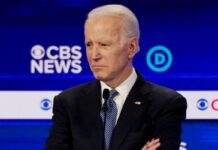With 150,00 Russian troops on Ukraine’s border and joint Russian-Belarussian military maneuvers, war could break out any day.
In late January, Joe Biden practically invited the Russians to invade, telling reporters, “[T]he idea that NATO is not going to be united, I don’t buy. … I think what you’re going to see is that Russia will be held accountable if it invades. And it depends on what it does. It’s one thing if it’s a minor incursion and then we end up having a fight about what to do and not do.”
The Biden Administration is still walking back the “minor incursion” remark, which sent NATO into an uproar. He has ordered troops to Eastern Europe and rattled a sword at Russia, warning of dire consequences if there is any invasion.
Since Biden took office, North Korea, Communist China, Iran, and Russia all have become more aggressive, threatening neighbors and denouncing the United States.
How much has Biden’s perceived weakness contributed to these dangerous trajectories and what should be done?
Bob McEwen leads the Council for National Policy, a group of national security, economic, and social conservatives that work to keep America strong.
Mr. McEwen was elected to represent Ohio’s Sixth district in the U.S. House of Representatives in 1980. Prior to his congressional service, he operated a successful Ohio real estate and development firm and served three terms in the Ohio General Assembly as the Senior Republican on the Financial Institutions and Insurance Committee.
In Congress, Bob filled a variety of positions. He was asked to serve as Special Presidential Envoy for both Presidents Reagan and Bush. He also served as a United States representative to the European Parliament from 1985 to 1993.
Rep. McEwen served as Chairman of the Environmental Affairs task force of the United States delegation to the European Parliament. He was selected by the Democratic leadership of the U.S. Congress as the chief spokesman for the United States in discussions with the European Green Party and other Environmental Organizations.
On August 23, 1989, Congressman McEwen and Sen. Bob Dole participated as United States observers in Warsaw, Poland to the first-ever Parliamentary election of a non-Communist leader of a Soviet bloc country. Hours later, the new Prime Minister, in his first official act, received the Congressman and Senator prior to meeting with the Soviet representatives of the regime that had occupied that nation for 50 years. This action was the spark that encouraged the collapse of Soviet-dominated governments throughout Eastern Europe culminating in the destruction of the Berlin Wall 10 weeks later. Senator Dole and Rep. Bob McEwen met the following day with the President and U.S. National Security team in Kennebunkport, Maine to fashion the United States response and position in support of Warsaw Pact nations seeking to break away from Soviet domination.
Rep. McEwen served as an official United States observer in Moscow during both the 1991 Soviet coup attempt and to the Kremlin in January of 1992 when the Soviet Union was dissolved.
Bob was elected by his colleagues to the two most coveted positions in the U. S. Congress: the Select Committee on Intelligence, which oversees all of our nation’s secrets, and the powerful House Committee on Rules, which has jurisdiction over all legislation. As one of only four Republicans on the 13-member Rules Committee, Mr. McEwen managed nearly one-third of all legislation on the House floor for the Republican side of the congressional aisle.
Bob McEwen’s legislation approved by Congress included the National Strategy Act, which realigned the chain of command during times of hostilities directly from the Theater Commander to the National Command Authority in Washington. Defense Secretary Dick Cheney and General Norman Schwarzkopf have credited this change with playing a major role in the success of Operation Desert Storm.
He was selected by administration and congressional leaders to floor manage such critical national security legislation as the B-2 bomber authorization, the nuclear freeze debate, and to give the closing arguments before the vote to authorize military action by the United States in Desert Storm.
Bob McEwen has often been selected as negotiator to bring resolution to Senate/House conference committee impasses on dozens of pieces of legislation, particularly affecting Public Works, the Clean Air Act, the Clean Water Act, and International Relations.
Mr. McEwen has appeared on CNN’s Crossfire, The Today Show, Good Morning America, Larry King Live, and other network programs. As a leading advocate for pro-family interests and free-market economics, he has written for numerous national publications and maintains an active international speaking schedule.
Bob is married to the former Liz Boebinger of Canton, Ohio. Together they have four children. Bob & Liz McEwen volunteer as speakers at Family Life Marriage Conferences in the United States and Canada.
Please join us for this important and stimulating discussion.

















